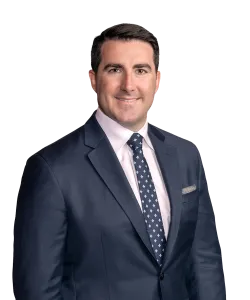First Circuit Joins Sixth and Eighth Circuits in Adopting Heightened, But-For Causation Standard for AKS-Based FCA Claims
Headlines that Matter for Companies and Executives in Regulated Industries
First Circuit Joins Sixth and Eighth Circuits in Adopting Heightened, But-For Causation Standard for AKS-Based FCA Claims
On February 18, the US Court of Appeals for the First Circuit became the latest court to agree that the Anti-Kickback Statute (AKS) requires proof of but-for causation to generate a per se False Claims Act (FCA) violation. In so doing, the First Circuit rejected the government’s claim that Medicare claims following an alleged AKS violation necessarily result from the alleged kickback, regardless of whether those claims would have been made even in the absence of the alleged inducement at issue in the case.
By way of background, the government alleged that Regeneron Pharmaceuticals, Inc. knowingly induced prescriptions of Eylea, a drug approved for treating neovascular age-related macular degeneration, by covering copayments for certain patients who received the drug. At the district court level, the parties filed cross-motions for summary judgment, with the government arguing that the facts established causation as a matter of law, while Regeneron argued that the government could not meet its burden to establish causation as a matter of law.
The district court denied both motions, agreeing with Regeneron that but-for causation was the appropriate standard, but also holding that there were genuine disputes of material fact precluding summary judgment as to causation. The district court, and then the First Circuit, granted permission to hear the question of the proper application of the causation standard on an interlocutory basis.
The First Circuit affirmed, agreeing with Regeneron that “a claim only ‘result[s] from’ an AKS violation if it includes ‘items or services’ that would not have been paid for by the government absent the AKS violation.” “Put differently,” the First Circuit continued, “an AKS violation must be a but-for cause of the challenged claim,” and so, “if a doctor would have purchased (and sought reimbursement for) Eylea anyway, then the subsequent Medicare claim cannot have ‘result[ed] from’ Regeneron’s allegedly illicit payments.” Of note, the court specifically acknowledged that it may be “difficult” to “prove why a doctor prescribed a particular drug,” but rejected that rationale as a basis for applying a standard different than but-for causation, observing that “the same could be said about the requirement to prove other elements of a successful action under the FCA, such as scienter.”
Looking forward, it is important to keep in mind the statutory backdrop for the First Circuit’s ruling. Before 2010, the government often claimed that an AKS violation led to an FCA violation under what’s known as a “false certification” theory, e.g., a drug manufacturer falsely represented compliance with the AKS on a federal form, which generated a false claim. In 2010, US Congress passed the amendment that set forth the language that was the subject of the First Circuit’s ruling — that any claim “resulting from” an AKS violation constitutes a false claim under the FCA.
The First Circuit’s ruling narrows the scope of liability for claims under the 2010 amendment, but it does not eliminate the possibility of clams brought under the pre-2010 “false certification theory.” In other words, the government can still bring its false certification claims — and those do not require proof of causation, but they do require proof of a false representation of AKS compliance on a federal agency form, as well as a showing of materiality. And the government can bring claims under the 2010 amendment, and those require proof of but-for causation, but they do not require proof of a false representation or a showing of materiality.
You may find the court’s opinion here.
Health Plan Agrees to Pay $29 Million to Resolve FCA Allegations That It Retained Overpayments
The US Department of Justice (DOJ) announced a $29 million settlement with St. Vincent Catholic Medical Centers of New York (SVCMC) to resolve allegations that SVCMC retained inflated payments made for treatments rendered pursuant to the Uniformed Services Family Health Plan (USFHP).
SVCMC provides, among other things, services to retired military members and their families participating in the USFHP, which then reimburses SVCMC at capitated rates. In 2012, the DOJ alleges that SVCMC realized that it was receiving overpayments due to errors in the calculation of those rates. Instead of notifying the government, SVCMC allegedly concealed the overpayments, continued to submit payments at inflated rates, and then conspired to avoid paying back the overpayments.
In a press release, Acting Assistant Brett A. Shumate, head of the DOJ’s Civil Division, remarked, “Those who receive public funds, including participants in government health care programs, must return funds to which they are not entitled.”
You can read the DOJ’s press release here.
Health Net Federal Services Agrees to Pay $11 Million Settlement
The DOJ also announced an $11 million settlement with Health Net Federal Services Inc. (HNFS) and its parent corporation, Centene Corporation, to resolve allegations that HNFS falsely certified compliance with cybersecurity requirements for federal contractors in the administration of the TRICARE program for the Defense Health Agency (DHA).
Between 2015 and 2018, the DOJ alleges that HNFS failed to scan for known vulnerability and remedy flaws in its networks and systems, and ignored audit reports of cyber security risks, yet annually certified that it complied with the requirements specified in its contract with DHA.
In a press release, Cyber Field Office Special Agent in Charge, Kenneth DeChellis of the Defense Criminal Investigative Service (DCIS) (the law enforcement arm of the US Department of Defense Office of Inspector General), emphasized the “significance of protecting TRICARE, and the service members and their families who depend on the health care program, from risks and exploitation,” noting that DCIS would “not be deterred from investigating contractors that fail to comply with federal cybersecurity requirements and risk exposing protected information vulnerable to criminal hackers.”
You can read the DOJ’s press release here.
Automotive System Supplier Settles FCA Allegations Arising From a PPP Loan for $14 Million
The DOJ also announced that YAPP USA Automotive Systems Inc., a subsidiary of a Chinese state-owned entity, agreed to pay $14,208,496 to resolve allegations that YAPP violated the FCA by submitting false claims to secure a Paycheck Protection Program (PPP) loan for which it was not eligible. The qui tam relator will receive a reward of $1,420,849 as part of the settlement.
According to the DOJ’s press release, YAPP received a first-draw PPP loan amounting to $9,598,462, which was subsequently forgiven by the US Small Business Administration (SBA). Regulations governing eligibility requirements for the PPP exclude certain types of businesses with over a certain number of employees. The DOJ contended that YAPP was not eligible for the PPP loan because it employed more people than permitted by the SBA regulations and because it was owned by a government entity.
The DOJ noted that YAPP received favorable credit under the DOJ guidelines for the company’s cooperation, disclosure, and remediation efforts. Nevertheless, acting US Attorney Richard G. Frohling for the Eastern District of Wisconsin stated, “This settlement demonstrates that our office will continue to hold accountable those businesses and individuals who abused this vital program.”
You can read the DOJ’s press release here.
Contacts
- Related Industries
- Related Practices






